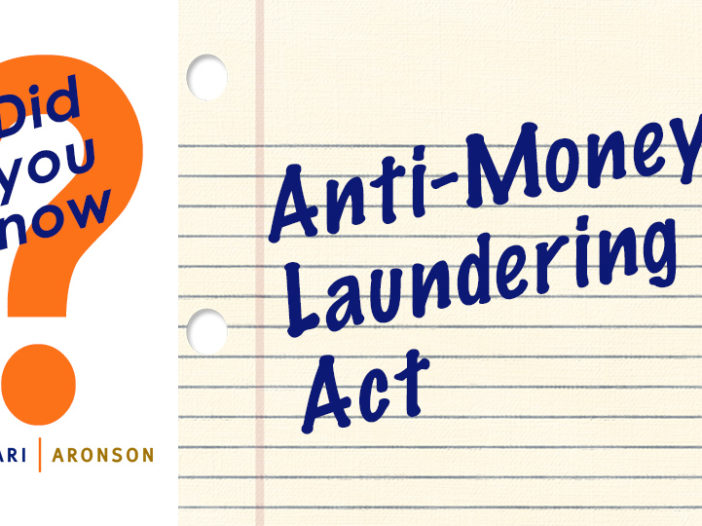
Did you know
You may soon need to disclose your shareholder list to the US Treasury?
by Shilpa Iyyer
We are watching the recently passed federal anti-money laundering law that, over the next few years, likely will subject small businesses to new disclosure requirements?
Last month, Congress passed the Anti-Money Laundering Act of 2020 (AMLA). The AMLA represents the most consequential legislation on the subject of corporate accountability and transparency in decades. Among the many sweeping changes, expansions, protections, and penalties introduced under the AMLA, it is the new beneficial ownership reporting requirement under the AMLA’s Corporate Transparency Act (CTA) that merits the immediate attention of small business owners.
The CTA requires certain corporations and limited liability companies in or operating in the United States to file a statement of beneficial ownership to the Financial Crimes Enforcement Network of the U.S. Treasury Department (FinCEN).
Who is subject to this requirement? The reporting requirement applies to all “reporting companies”, which is defined to include all U.S. corporations or limited liability companies, as well as foreign entities qualified to do business in the U.S. The CTA provides a number of exemptions to this broad definition. In particular, the obligation will not apply to companies that are already subject to certain federal reporting obligations, as well as financial institutions, political organizations, non-profits, and charitable trusts. Larger businesses are also relieved as the definition further excludes entities that (i) employ over 20 full-time employees in the U.S., (ii) had over $5 million in gross revenue in the past year, and (iii) operate from a physical office within the U.S. The reporting requirement will thus deliberately target smaller businesses.
What do reporting companies have to disclose? The disclosure submitted to FinCEN must include the full name of each beneficial owner, date of birth, current address, and an identification number from a government-issued identification document. The CTA defines a “beneficial owner” as any individual who directly or indirectly exercises substantial control over the entity, or one who owns or controls at least 25% of the ownership interests of the entity. As yet, substantial control is an undefined term, and further guidance on the interpretation of this term is expected to follow.
When must reports be filed? The Department of Treasury has until the end of 2021 to publish regulations on how to implement the provisions of the CTA. Existing companies subject to the reporting requirements will have to file within 2 years of the effective date of those regulations; companies formed following the effective date will need to file at the time they are formed. Procedures specifying where and how to submit are still being determined.
How is the information going to be used? Beneficial ownership information will be held in a secure, non-public registry managed by FinCEN. Though inaccessible to the public, information in the FinCEN registry could be shared for compliance or intelligence purposes with financial institutions, law enforcement agencies, national security agencies, and other regulatory agencies (all in accordance with applicable law regarding the confidentiality of personal information).
These new measures – along with other components of the AMLA – are meant to discourage individuals from relying on shell companies to transfer or disguise the origin of illicit funds. Time will tell how well the AMLA framework will serve this larger mission. As the year goes on and further guidance is issued, we encourage companies to consult with their legal and accounting advisors on their federal reporting obligations in light of this new development.[1]




